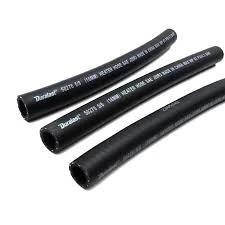Guidelines for Choosing and Maintaining Car Air Conditioner Hoses
Dec . 26, 2024 05:27 Back to list
Guidelines for Choosing and Maintaining Car Air Conditioner Hoses
Understanding Car Air Conditioner Hoses Importance, Types, and Maintenance
When it comes to automotive cooling systems, the air conditioner (AC) is a luxury that has become a standard feature in modern vehicles. While the entire AC system requires careful engineering, one of the most vital components often overlooked are the air conditioner hoses. These hoses play a crucial role in the effective functioning of your car's AC system, and understanding them can help you maintain your vehicle better and prevent costly repairs.
What are Air Conditioner Hoses?
Car air conditioner hoses are designed to transport refrigerant throughout the AC system, connecting various components such as the compressor, condenser, evaporator, and expansion valve. The AC system operates by cycling refrigerant through a series of processes that absorb heat from the cabin and release it outside. Efficient movement of the refrigerant is critical, and that's where the hoses come in.
There are generally two types of hoses in an automotive AC system high-pressure hoses and low-pressure hoses.
1. High-Pressure Hoses These hoses transport refrigerant from the compressor to the condenser. As the refrigerant is compressed, it becomes a high-pressure gas that needs to be cooled down before it reaches the evaporator. High-pressure hoses are built to withstand significant pressure and are usually reinforced to prevent rupture.
2. Low-Pressure Hoses After releasing heat at the condenser, the refrigerant becomes a low-pressure liquid that moves to the evaporator. The low-pressure hoses carry this liquid, allowing it to absorb heat from the cabin air, turning it back into a gas as it cools the interior of the vehicle. These hoses are less robust than high-pressure hoses but are equally essential.
Importance of Air Conditioner Hoses
Understanding the importance of AC hoses can prevent expensive repairs down the line. Over time, hoses can wear out, crack, or become brittle, leading to refrigerant leaks. This not only reduces the efficiency of the AC system but can also cause harm to other components due to the lack of proper cooling. Additionally, a malfunctioning AC system might force a driver to operate a vehicle in uncomfortable conditions, especially during sweltering summer months.
car air conditioner hoses

Moreover, a refrigerant leak due to damaged hoses can lead to environmental hazards. Many refrigerants used in car air conditioning systems have harmful effects on the ozone layer. Thus, a timely check on the condition of your AC hoses can contribute to both your comfort and environmental responsibility.
Signs of Hose Problems
To keep your AC system functioning effectively, it is vital to recognize the signs of potential issues with the hoses. Here are a few indicators
- Reduced Cooling Efficiency If you notice that your AC is struggling to cool the cabin, it could be due to a refrigerant leak caused by damaged hoses. - Visible Damage Look for cracks, bulges, or other defects on the hoses. Any visible wear can indicate it’s time for a replacement. - Unusual Noises Hissing or bubbling sounds coming from the AC system can signify a refrigerant leak, possibly from a failing hose. - Moisture Accumulation of moisture or oil around the hoses could signal a refrigerant leak.
Maintenance Tips
Maintaining your car’s air conditioner hoses involves regular inspection and timely replacement when needed. Here are a few tips
1. Regular Inspections Make it a habit to visually inspect your AC hoses periodically. Look for any signs of wear or damage to ensure they are in good condition. 2. Professional Help Schedule regular maintenance checks with a qualified mechanic. They can perform pressure tests and inspect hoses for damage that may not be visible to the untrained eye. 3. Keep it Clean Avoid exposure to harsh chemicals or environments that could accelerate wear on the hoses. Keep the area around the hoses clean and free of debris.
4. Timely Replacement If you notice any signs of damage, do not delay in replacing the hoses. It's better to spend a little money on maintenance than to face the hefty cost of a full AC system repair.
In conclusion, car air conditioner hoses are essential components of your vehicle's AC system. By understanding their importance, recognizing the signs of potential issues, and maintaining them properly, you can ensure your vehicle remains comfortable to drive, while also prolonging the overall life of your AC system.
